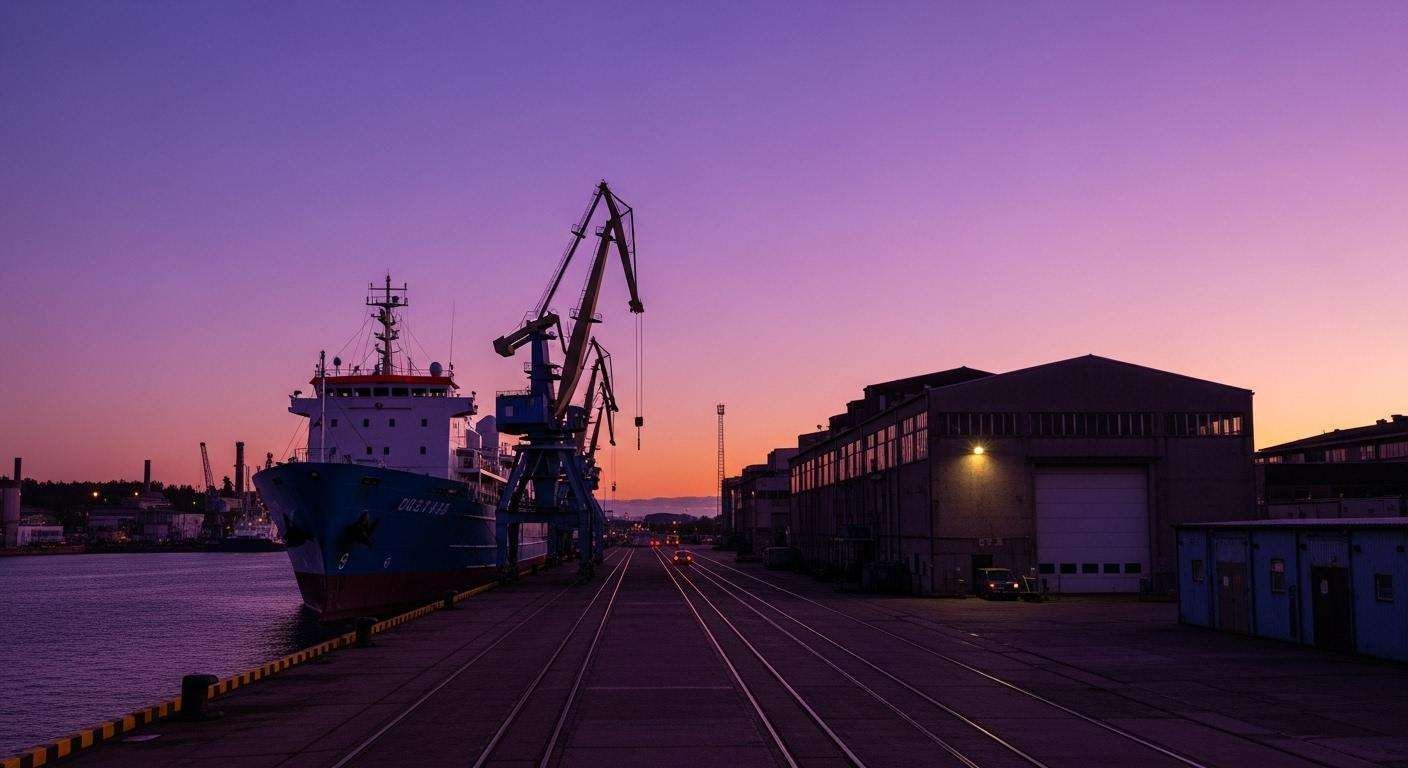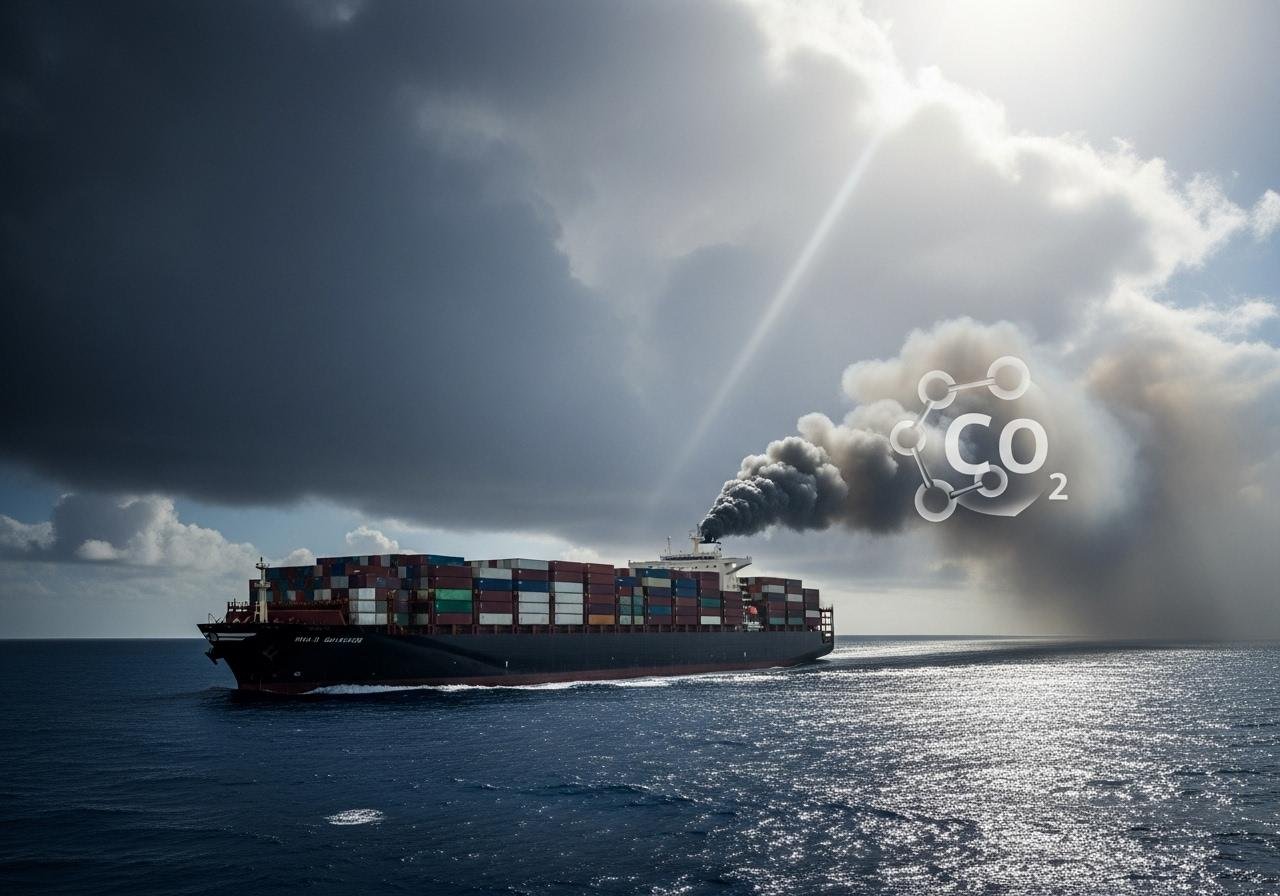
Introduction to the Issue
Global shipping is responsible for about 3% of global CO₂ emissions, releasing nearly 1 billion metric tons of carbon dioxide each year. As more than 80% of world trade by volume moves by sea, the sector plays a vital yet polluting role in global commerce. The International Maritime Organization (IMO) has set a target of achieving net-zero emissions by 2050, with interim goals to cut emissions 30% by 2030 and 70% by 2040. Progress is being driven by innovations such as green ammonia, hydrogen, and wind-assisted propulsion, along with smarter route optimization and electrified vessels. However, with trade volumes rising, reducing shipping’s carbon footprint remains one of the biggest challenges for a sustainable global economy.
The global community, recognizing this issue, once rallied to impose a carbon tax on shipping. This proposed carbon tax was not just a nod toward reducing emissions but a bold step in the mission to slow climate change.
Initially, there was a collective agreement that something had to be done. The world’s leaders largely agreed that a carbon tax on shipping could be a game-changer, a critical tool in regulating emissions and encouraging cleaner practices. But then came a twist in the story, primarily influenced by U.S. politics. Enter Donald Trump, whose administration (surprise surprise) took a distinct stance that threw a wrench into the works.
The Role of Shipping in Global Emissions
A carbon tax aims to change that by incentivizing cleaner technology and practices, nudging the industry to lower its emissions from the current 3% even as shipping volumes increase. Why is this vital? Well, the ocean is not just a convenient highway for goods; it’s also a regulator of our climate. Shipping emissions harm marine life and contribute to climate change, with consequences that ripple far beyond the seas. The need for a solution is pressing, and a carbon tax could steer the industry toward a more sustainable path.

Trump’s Opposition and Strategy
During his tenure, Trump was no stranger to controversy, especially regarding climate policy.
Indeed just last month at the United Nations General Assembly on September 23rd 2025 in his speech he stated that climate change “is the greatest con job ever perpetrated on the world, in my opinion. … All of these predictions…were made by stupid people that of course their country’s fortunes and given those same countries, no chance for success. If you don’t get away from this green scam, your country is going to fail.”
So it is not surprising whatsoever that along with a slew of anti-climate action his administration opposed the shipping carbon tax, arguing it could hamper economic growth and increase costs for American consumers.
But there was more to it than just economic apprehension. The Trump administration engaged in a campaign of influence, lobbying allies and partners to rethink or delay the tax. Diplomatic conversations, behind-the-scenes meetings, and strategic positioning were all part of this diplomatic dance. Though many might have anticipated this strategy, the impact was undeniably potent, altering the course charts of some nations.
Global Reactions and Responses
The ripple effect of the U.S. stance was felt worldwide. Key players in the international arena expressed their dismay, while others, perhaps opportunistically, aligned with the U.S. position. As countries revisited their positions, the unity that had initially characterized the carbon tax proposal began to falter.
Global summits, once hopeful gatherings for climate action, became arenas of debate and disagreement. While some nations doubled down on their commitments to address shipping emissions, others hesitated, influenced by the U.S.’s hesitancy. The winds of change had altered global trajectories, reminiscent of the shifts seen in corporate sustainability efforts.

Economic Implications of Delaying the Tax
When you halt progress on such a significant environmental measure, there’s a price to pay—and not just in emissions. Concerns about the immediate financial burden of implementing the tax added fuel to the debate. Would the cost of adaptation stifle an industry that supports global trade? Or could a delayed tax provide a much-needed economic cushion? The truth is, delaying the tax does have broader economic implications. While some argue it allows time for gradual adaptation, others warn that procrastination only increases long-term costs, both economically and environmentally. It’s a complex balance, a teeter-totter of immediate financial concerns versus future stability.
Environmental Consequences of the Delay
The environmental cost of pushing pause on the carbon tax cannot be overstated. Short-term, the delay extends the status quo, with emissions continuing to ebb unchecked from the shipping industry. Long-term, it risks undercutting international climate targets—a sobering thought when considering our warming planet.
Some proponents suggest alternative measures or transitional strategies, but these can feel like stopgaps rather than lasting solutions. The overarching concern is clear: postponed action today begets a steeper challenge tomorrow. This echoes the sentiments shared in discussions surrounding the educational approaches to environment-related challenges.

Current Status and Future Prospects
Fast forward to 2023, and the carbon tax debate remains in flux. Recent international climate agreements continue to nudge the shipping industry towards cleaner operations, yet the absence of a binding tax is palpable—a goal not quite within reach. However, hope floats. The conversation continues, with newer agreements hinting at future possibilities. Nations are gathering, discussions are resuming, and the atmosphere—pun intended—is one of cautious optimism. When the world eventually agrees to sail this course, the changes could be profound.
Conclusion and Reflection
Implementing a carbon tax on shipping is not just about spreadsheets and emissions forecasts; it’s a narrative rich with international intrigue and complex challenges. Balancing economic realities with environmental duties is an ongoing story that will require collaborative efforts and shared goals.
Ultimately, the stakes are too high to ignore. Continued international cooperation is critical to tackling these pressing issues and steering the world toward a sustainable future. Because if we take anything away, it’s that the ocean’s vastness should not dwarf the importance of our environmental responsibilities.

Keypoints and FAQs
- The shipping industry is a significant contributor to global greenhouse gas emissions, making up nearly 3% of total emissions.
- The proposed carbon tax aims to lower these emissions by incentivizing cleaner technologies.
- The Trump administration opposed the tax, citing economic concerns, and influenced other nations to delay its implementation.
- This delay has both economic implications for global trade and environmental consequences on climate goals.
- Despite the delay, discussions continue, offering hope for future international agreements.
FAQs
Why did Trump oppose the carbon tax on shipping?
Trump argued it could hinder economic growth and impact consumer costs.
What is the current status of the carbon tax proposal?
As of 2025, the tax is delayed, but discussions and negotiations are ongoing.
How significant are shipping emissions globally?
Shipping accounts for nearly 3% of the world’s greenhouse gas emissions.
What are the possible economic impacts of the tax delay?
- Shipping emissions are a significant environmental concern.
- A carbon tax was proposed to address these emissions.
- The Trump administration influenced a delay in the tax’s implementation due to economic concerns.
- The delay has both economic and environmental repercussions.
- The debate continues, with hopes for future global agreements.
This article is for informational purposes only.
The post Trump Pressures Nations to Delays a Carbon Tax on Shipping appeared first on Green.org.














